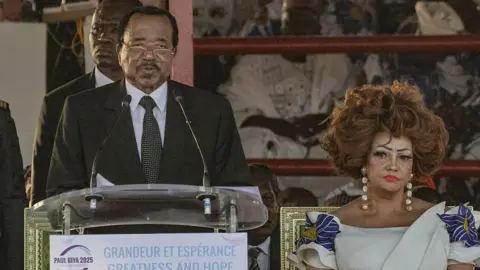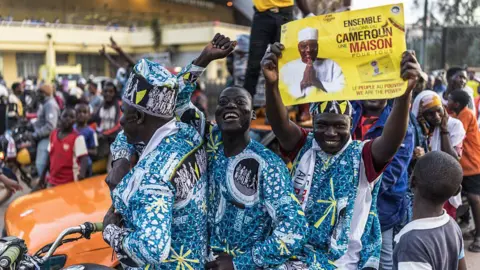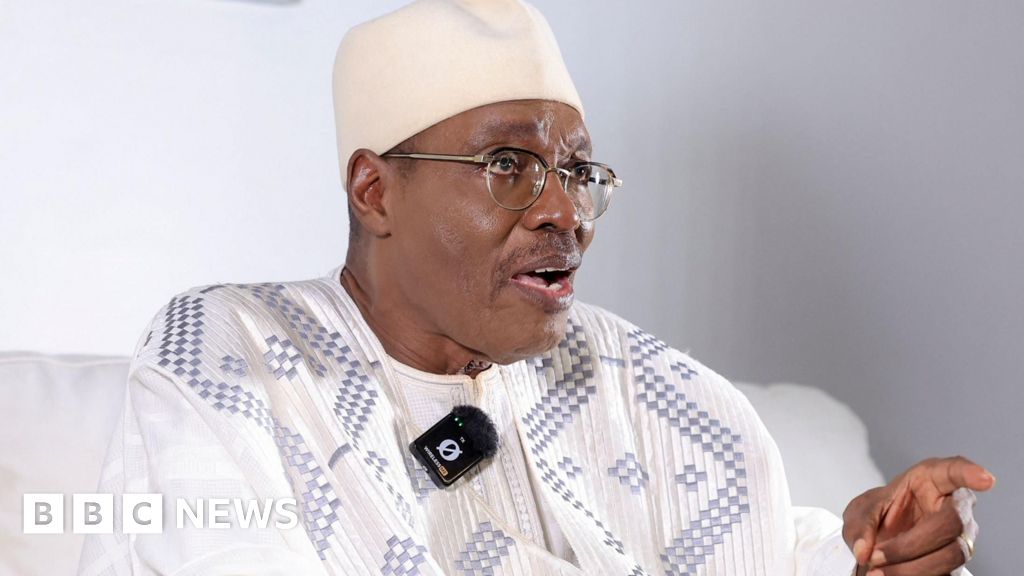Paul Njie,BBC Africa, Garoua and
Wedaeli Chibelushi
Cameroon’s opposition leader Issa Tchiroma Bakary, who has declared himself the winner of the 12 October elections, has told the BBC that he will not accept a stolen vote, with the results due to be announced on Monday.
He says his team has compiled the overall picture based on results from individual polling stations, so there is no doubt.
Tchiroma Bakary, 76, is a former government minister who broke ranks with President Paul Biya, 92, who is seeking another term after 43 years in power.
The ruling party has dismissed Tchiroma Bakary’s victory claims and several officials have described it as illegal because only the Constitutional Council can proclaim official results.
In an interview at his home, in the northern city of Garoua, Tchiroma Bakary said he had urged his supporters to defend their votes.
“We will never accept their votes being stolen by anyone,” he said, dressed in a long, flowing white and gold tunic.
The former minister said he was not concerned about being arrested or put in jail, “but I know that I have already won the presidential election”.
“There is no doubt, no shadow of doubt whatsoever. My victory is undeniable,” he said, appearing placid and resolute throughout the conversation.
Tchiroma Bakary said the ruling CPDM party had “their backs against the wall” and could not accept the reality of the vote, and challenged them to show if what he was saying about the election was wrong.
He defended his decision to declare himself himself the winner, insisting that the law “does not prevent us from so doing”.
Tchiroma Bakary has previously said he won the election with about 55% of the vote, based on returns representing 80% of the electorate.
Asked whether he would accept defeat if someone else is declared the winner, he said he would agree “provided the Constitutional Council announces the results that comes from the ballot box, not ballot stuffing”.
Tensions over the delayed announcement of the election results have been growing, sparking fears of post-electoral violence in a country already rocked by a separatist conflict in the Anglophone regions and Boko Haram insurgency in the Far North region.
In Garoua, a general feeling of uncertainty lingers following protests earlier this week. Security forces patrol the streets during the night, although their presence in the day time has decreased.
The highly respected and influential Catholic Church in Cameroon this week urged calm following fears that violence could erupt once official results are declared.
Catholic bishops said they hoped the official result would reflect the will of the electorate, and “nothing will be changed by any authority involved in this exercise”.
 AFP
AFPBorn in Garoua, Tchiroma Bakary trained as an engineer in France before returning to Cameroon to work for the national railway company.
In 1984, he was thrown in jail, accused of being involved in an attempt to depose President Biya. Despite denying the allegation and never being convicted, Tchiroma Bakary spent six years in prison. There, he farmed the land with his fellow inmates and taught himself how to speak English.
On his release from prison, Tchiroma Bakary began his political career. He became an MP for the opposition UNDP in 1992, but entered an alliance of sorts with Biya and served as his minister of transport for four years.
Tchiroma Bakary also served as communications minister from 2009 to 2019.
As communications minister and the government’s spokesperson, he resolutely defended Biya’s government during crises such as the Boko Haram insurgency, when the army was accused of killing civilians.
But in June, just four months before the general elections, Tchiroma Bakary changed course dramatically, resigning from the government and announcing he would run against Biya for the presidency.
He accused the president of becoming increasingly out of touch, saying “a country cannot exist in the service of one man”.
Despite his recent role as the government’s mouthpiece, Tchiroma Bakary drew huge crowds at his rallies, electrifying voters desperate for change.
After four decades of Biya’s rule, economic development has stagnated and challenges such as inflation, unemployment and insecurity abound.
 AFP via Getty Images
AFP via Getty ImagesAdditionally, residents in the English-speaking western region of Cameroon have long complained of marginalisation, and so many there automatically backed Tchiroma Bakary against Biya, seen as representing the French-speaking majority.
At one rally in the economic capital of Douala, thousands of supporters waited for hours in the rain to hear Tchiroma Bakary speak. He knows how to command a crowd – a stark contrast to Biya, who spent most of the campaign period in Europe and only showed up for one rally.
Some are not so taken with the former spokesperson, however. In his home city of Garoua, a couple of residents told the BBC that Tchiroma Bakary was not their ideal candidate, but at least he offered a change from Biya’s lengthy rule.
“We can’t continue with the level of underdevelopment that is crippling Cameroon,” said farmer Benjamin Temunga.
Tchiroma Bakary has also sought to distance himself from the government, apologising for his role as its spokesperson.
For instance, he defended the military despite knowing they were committing atrocities in amid the Anglophone crisis – a conflict that has seen separatist fighters battling the authorities for more than six years.
“I 100% agree that the military committed atrocities,” he said. “But as Minister of Communication, my duty was to defend our armed forces. Today, I speak as a free man.”
Calm and plain-speaking, Tchiroma Bakary is resolute in his stance that the people have put their trust in him. He is the rightful president, he tells the BBC.
“The nation knows it, the world knows it.”
Additional reporting by Basillioh Rukanga
You may also be interested in:
 Getty Images/BBC
Getty Images/BBC

